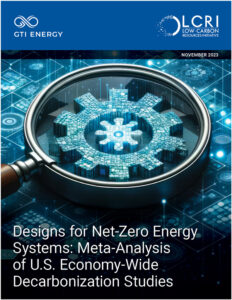REPORT: With a Surge in Global Net-Zero Commitments Expected at COP28, GTI Energy's New Meta-Analysis Explores Pathways to U.S. Economy-Wide Decarbonization
Comparative analysis of five U.S. economy-wide net-zero studies reveals common themes and a wide range of possibilities for achieving net-zero emissions by 2050
November 30, 2023
Des Plaines, IL
 As the global community convenes at COP28 in Dubai, all eyes are on governments and companies to take bold steps toward achieving net-zero emissions. A new report, Designs for Net-Zero Energy Systems: Meta-Analysis of U.S. Economy-Wide Decarbonization Studies (“Meta NZ”), published today by GTI Energy, presents a comparison of five comprehensive U.S. net-zero studies revealing a wide range of possibilities and key commonalities for achieving net-zero emissions.
As the global community convenes at COP28 in Dubai, all eyes are on governments and companies to take bold steps toward achieving net-zero emissions. A new report, Designs for Net-Zero Energy Systems: Meta-Analysis of U.S. Economy-Wide Decarbonization Studies (“Meta NZ”), published today by GTI Energy, presents a comparison of five comprehensive U.S. net-zero studies revealing a wide range of possibilities and key commonalities for achieving net-zero emissions.
“Success in building low-carbon and low-cost energy systems requires strategic decision-making and action-taking guided by a systems perspective,” said Paula Gant, President and CEO, GTI Energy. “Drawing on well-researched analysis of the technologies, solutions and infrastructure that can inform actions this decade, the Meta NZ report synthesizes expert perspectives of diverse pathways for consideration and comparison, to fulfill our ambitions of decarbonizing U.S. energy systems by mid-century.”
The Meta NZ report examines five in-depth studies that modeled designs for net-zero energy systems spanning across sectors, value chains, and energy carriers. The five studies analyzed were conducted by the Low-Carbon Resources Initiative, Open Energy Outlook, Evolved Energy Research, Princeton University, and Decarb America.
Five key commonalities emerged across the studies:
- Renewables grow the supply of low-carbon energy.
- Electricity expands across sectors.
- Fuels diversify and serve multiple markets.
- Efficiency reduces energy consumption while enabling economic growth.
- Carbon dioxide removal balances remaining emissions.
“Transitioning from net-zero pledges to concrete action requires a clear understanding of the pathways and technologies needed to achieve economy-wide decarbonization,” said Derek Wissmiller, Director of Strategic Analytics, GTI Energy. “By synthesizing insights from multiple net-zero studies, we can gain fresh perspectives on the common approaches, range of possibilities, and areas of differentiation in net-zero system designs.”
“This study brings to the forefront overarching energy transition realities that have emerged through the Low-Carbon Resources Initiative,” said Neva Espinoza, Vice President, Energy Supply and Low-Carbon Resources, Electric Power Research Institute. “Our research shows that driving decarbonization across the economy is a team sport – one that rests on harnessing the full value of clean energy technologies through close collaboration across all stakeholders, from technology development to deployment to commercial operation.”
“We’re excited that Decarb America’s modeling results are being used to generate new insights about what it will take to achieve net-zero greenhouse gas emissions across the U.S. economy by 2050,” said Lesley Jantarasami, Energy Program Managing Director, Bipartisan Policy Center. “With multiple pathways for reaching our net-zero goals examined in this report, it reinforces the urgency to now implement a well-planned transition to a clean energy economy.”
"Drawing fair comparisons between energy system models is a challenging task given their complexity and different modeling assumption, however, doing so is important and insightful,” said Michael Blackhurst, Executive Director, Open Energy Outlook Initiative, Carnegie Mellon University. “Comparisons provide helpful feedback to individual modeling teams and add important nuance to the policy decisions informed by model results. GTI Energy has done a thoughtful job in their analysis and reporting. We appreciate being included in their study."
“Being a relatively new field of study, cross-study comparison is an essential step in the maturation of long-term energy planning for achieving net-zero emissions,” said Ryan Jones, Co-founder, Evolved Energy Research.
“Cross-study comparisons consider a wealth of possible pathways and insights to inform how we can reach our net-zero goals effectively,” said Florian A. Schneider, Ph.D., Senior Research Advisor, Third Way. “We must continue to prioritize this kind of comparison to better understand the full scope of investments needed to deliver a carbon-free future.”
“As macro-energy system models become increasingly complex, understanding the structure and assumptions of individual models is vital,” said Cameron Wade, Principal, Open Energy Outlook, Sutubra Research. “This meta-analysis plays an important role in this respect, by clarifying these elements and distilling key findings between models, thereby providing a more nuanced perspective on the evolving landscape of the energy transition.”
For more details and resources, visit the GTI Energy Meta NZ web page: https://www.gti.energy/meta-nz/
About GTI Energy
GTI Energy is a leading technology development organization. Our trusted team works to scale impactful solutions that shape energy transitions by leveraging gases, liquids, infrastructure, and efficiency. We embrace systems thinking, innovation, and collaboration to develop, scale, and deploy the technologies needed for low-carbon, low-cost energy systems.
Share This News
We welcome you to share via your social media or email
